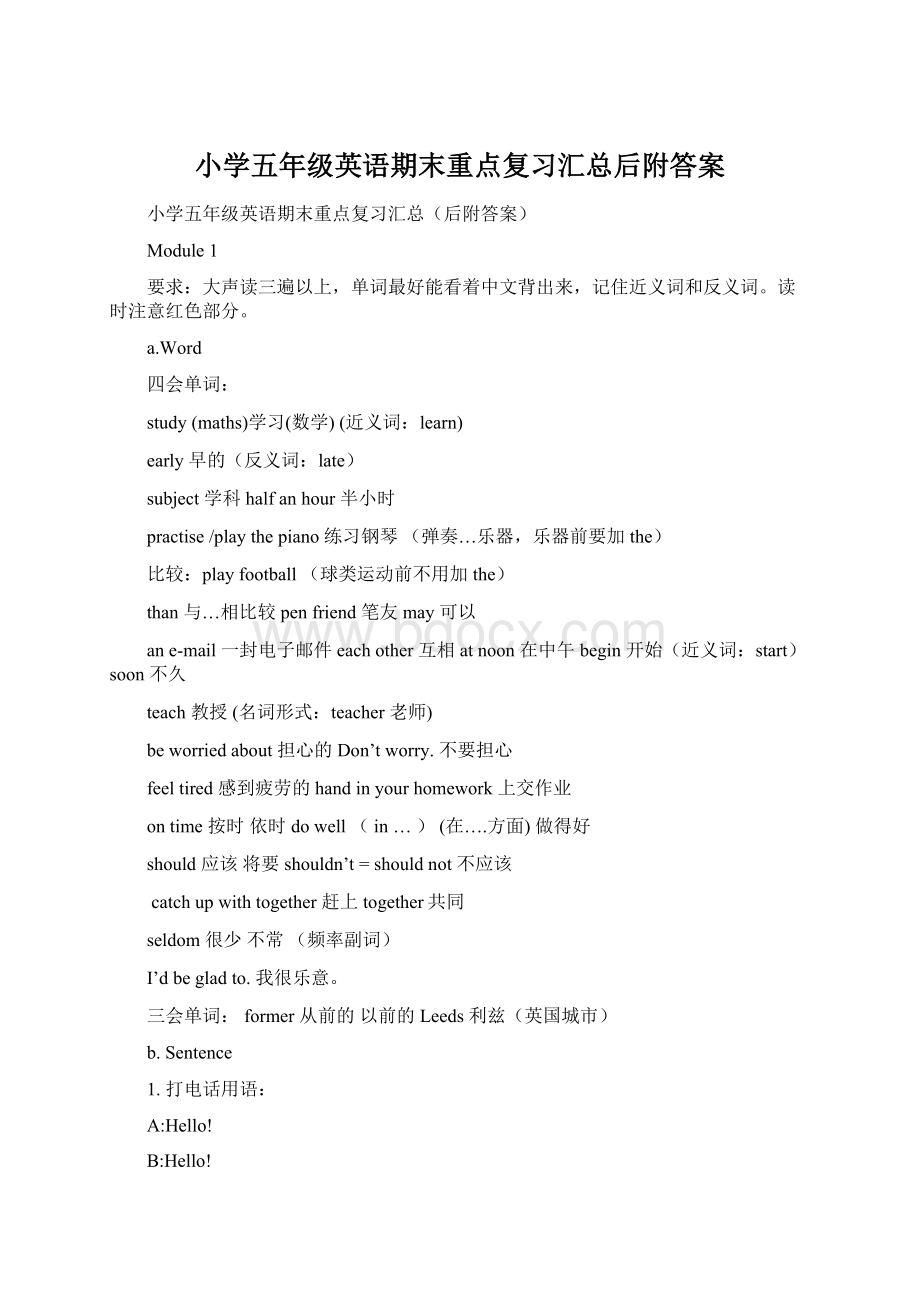小学五年级英语期末重点复习汇总后附答案文档格式.docx
《小学五年级英语期末重点复习汇总后附答案文档格式.docx》由会员分享,可在线阅读,更多相关《小学五年级英语期末重点复习汇总后附答案文档格式.docx(14页珍藏版)》请在冰豆网上搜索。

I’mfine,thankyou.Andyou?
I’mfine,too.Thanks.
2.介词的搭配
Onweekdaysshealwaysdoesherhomeworkafterdinner.
Attheweekendshepractisesthepianoforhalfanhourlikeyou.
3.
Iwanttobeherpenfriend.我想成为她的笔友。
WhatshouldIdo?
我应该怎么做?
Ishould…
Let’shelphimtogether.让我们一起帮助她。
Heplayscomputergamestoomuch.他玩太多的电脑游戏。
Hecan’tdowellinclass.他在课堂上表现不好。
Heislateforwork/school.他上班/上学迟到。
Couldyouhelpme?
I’dbegladto./Yes,ofcourse./Sure./Yes,please./OfcourseIcan.
c.语法
(一)一般现在时:
特征词:
与every连用的时间;
不变的事实;
频率副词(always-usually-often-sometime-seldom-never)等(详见前面一般现在时的笔记)
1.主语为非三单时,动词用原形。
肯定句:
Igetupearlyonweekdays.
否定句:
Idon’tgetupearlyonweekdays.
一般疑问句:
Doyougetuponweekdays?
Yes,Ido./No,Idon’t.
特殊疑问句:
Whatdoyoudoonweekdays?
Igetupearly.
2.主语为三单,动词要变化。
Healwaysworksinhisbedroomafterdinner.
Hedoesn’talwaysworkinhisbedroomafterdinner.
Doeshealwaysworkinhisbedroomafterdinner?
Yes,hedoes.No,hedoesn’t.
Whatdoeshedoinhisbedroomafterdinner?
(在否定句和问句中,助动词do变为does,动词就不变化。
)
(二)情态动词
内容:
can,could,must,will,would,may,should
用法:
后面跟动词原形。
例句:
Wemustn’tpicktheflowers.
Youmaye-maileachother.
WewillgotothezoothisSunday.
Ishouldtakearest.
Module2
A.Words
feelill感觉有病lookpale看起来脸上苍白
What’sthematter?
有什么问题吗?
wakeup醒来
getdressedquickly快点穿衣服
bad坏的(反义词:
good)first首先
haveacold感冒haveaheadache头痛
haveatoothache牙痛haveapain疼痛
haveafever发热;
发烧haveabath洗澡
takemedicinethreetimes服药三次sweet糖果
you’dbetter=youhadbetter你最好…
plentyof许多(单数形式:
plenty)
giveyouacheckup给你做个身体检查
haveastomachache胃痛;
肚子痛
B.症状名词
(I)haveacold(.)(我)感冒(了。
)
(Ihavea)headache(.)(我)头痛(。
(Ihavea)toothache(.)(我)牙痛(。
(Ihavea)fever(.)(我)发热;
发烧(了。
(Ihavea)stomachache(.)(我)胃痛;
肚子痛(。
(Ihavea)pain(here.)(我这里)痛苦;
疼;
痛(。
B.Sentence
1.看医生用语:
Doctor:
What’sthematter?
Patient:
Idon’tfeelgood/well.
Doctor:
Youlooktiredandpale.
Patient:
IthinkI’mill.
SometimesIfeelhotandsometimesIfeelcold.
Openyourmouthandsay“Ah”.Youhaveafever.
Youshoulddrinkplentyofwater.
Takethemedicinethreetimesaday.
You’dbetterstayinbed.
2.重点句型:
Idon’twanttobelateforschool.我不想上学迟到。
Janetdoesn’tfeelgoodthismorning.Janet今天早上感觉不好。
(今天早上应翻译成thismorning)
Letmegiveyouacheckupfirst.让我先给你做个检查。
(固定搭配)
Doyouwalkaloteveryday?
你每天都走路吗?
(alot=verymuchdrinkalot,thanksalot)
Ireadforalongtimeeverynight.我每个晚上都阅读很长时间。
(for后一般跟较长的一段时间)
Idon’tlikeitmuch.我非常不喜欢它们。
Thechildrenwalktoschoolwiththeirfathereverymorning.孩子们每天和他们的爸爸一起走路去上学。
Takethemedicinethreetimesaday,Janet.Janet,这个药每天服三次。
Andstayathomeforoneday.和在家休息一天。
C.语法
1.many+可数名词
much+不可数名词
lotsof可数名词
alotof+
plentyof不可数名词
Youshouldn’teattoomanysweets.
Youshouldn’tdrinktoomuchCoke.
Youshouldeatplentyoffruit/vegetables.
Youshouldn’tdrink/eatlotsofcoldwater/cakes.
Youshoulddrink/eatalotofmilk/oranges.
2.归纳
1)时间前的介词搭配:
inthemorning\intheafternoon\intheevening
atnight\atnoon
2)every、this、that前不用介词
everymorning\everyafternoon\everyevening\
everynight\everyday
thismorning\thisafternoon\thisevening
3.问数量
Howmanybooksdoyouhave?
Howmuchfruitdoyoueat?
(如果问的是可数名词,就用Howmany;
如果问的是不可数名词,就用Howmuch)
4.区别:
It’stimetogetup.到时间起床了。
(timeto后跟动词原形)
It’stimeforbreakfast.到早餐的时间了。
(timefor后跟动名词\名词)
MODULE3
A.Words:
四会:
形容词:
bright光亮的,better更好的,tidy整齐的
large大的(反义词:
small近义词:
big)
代词:
ours我们的,his他的,hers她的theirs他/她/它们的,mine我的,its它的
名词:
country国家,language语言
needn’t=neednot不必(need后面跟动词原形)
词组:
fourlargeplaygrounds四个大的操场
morethan多于
ninethousandspupils九千个小学生
haveto不得不
workhard[hard-working]努力工作的
三会:
GuangzhouInternationalSchool广州国际学校
B.Sentences:
比较级:
Isyournewschoolmuchlargerthantheoldone?
Yes,it'
smuchlarger.
Youteacherhaveaharderjobtodo.
问时间:
Whattimedoyourclassbegin?
Ataquartertoeight.
Whattimedoyouleaveschool?
Ataboutfive.
问数量:
Howmanypupilsarethereinyourschool?
Thereareaboutonethousandandeightypupilsthisterm.
发出邀请:
WouldyouliketovisitournewschoolnextFriday?
Yes,I'
dloveto.
问来自哪个国家:
Whatcountrydoyoucomefrom?
IcomefromChina.
Whatlanguagedoyouspeak?
IspeakChinese.
问喜欢哪个学科:
Whichsubjectdoyoulikebetter,ChineseorEnglish?
IlikeEnglishbest.
C.Grammer
一.比较级:
1.比较级:
两者之间进行比较。
2.结构:
A+be+比较级+than+b
3.特征词:
than
4.比较级词前可用much来修饰
5.句型:
BuildingAistallerthanBuildingB。
I’mmuchthinnerthanhim.
Herunsfasterthanme.
Ijumphigherthanher.
5.副词和形容词的比较级变化规律:
1)大多数形容词直接在后面加-er.
tall—tallersmall—smallerlow—lower
2)以e结尾的单音节词,直接加-r.
large—largernice—nicerlate—later
3)在重读闭音节(即:
辅音+元音+辅音)中,先双写末尾的字母,再加-er.
big—biggerhot—hotterthin-thinner
4)以辅音字母加y结尾的单词,去y改i再加-er.
early—earliereasy—easier
5)多音节的词直接在前面加more.
beautiful—morebeautifulslowly—moreslowly
6)不规则变化.
good/well—bettermany/much—more
二.代词:
人称代词:
主格:
Iyouhesheitweyouthey
一般放在句首,和所有动词前。
Herunsfast./Ihaveabag./Heisdoinghishomework.
宾格:
meyouhimheritusyouthem
一般放在句末,和动、介词后。
Letmegiveyouacheckup./Sheistallerthanhim.
物主代词:
形容词性:
meyourhisheritsourtheir
后面必须跟名词。
名词性:
mineyourshishersitsourstheirs
后面不跟名词,可单独使用。
Ourclassroomisbiggerthantheirs.
Thesebooksareyours.
Theirschoolisbeautiful.
Module4
(a)Words
Animals(动物):
bluewhale蓝鲸dinosaur恐龙shark鲨鱼aneagle鹰
cheetah猎豹leopard豹crocodile鳄鱼
单位:
metre米;
公尺kilometre公里ton吨(三会)
其他:
onland在陆地上weigh称…重量over越过bone骨(三会)
(b)Sentence
1.问世界上/陆地上最大的动物
Whatarethebiggestanimalsintheworld?
Bluewhalesarethebiggestanimalsintheworld.
Whatarethebiggestanimalsonland?
Elephantsarethebiggestanimalsonland.
2.比较级:
Whichisbigger,abluewhaleoradinosaur?
Abluewhaleisbiggerthanadinosaur.Abluewhalecanbemorethanthirtymetreslongandweighsover150tons.
3.最高级:
Benisthestrongestintheclass.
Whichoftheseanimalsjumpshighest,sheep,bearorkangaroo?
Kangaroojumpshighest.(三种动物进行比较就是最高级)
4.原级、比较级和最高级的比较:
Myroomisbig.(只有一种,没有比较,只能用原级)
Mysister’sroomisbiggerthanmine.
Myparents’roomisthebiggestofthethree.
5.问速度:
Howfastcanacheetahrun?
Morethanninety-fivekilometersanhour.
6.问外貌:
Whatdoesacheetahlooklike?
Itlookslikealeoprd.
(c)语法:
最高级:
把三个或以上的物体进行比较,表示其中最…的一个。
the、intheworld/school/class(一个大范围)、ofthethree(三者之间)
Mikeisthetallestboyinhisclass.
Cheetahsrunfastestintheworld.
Eagleflieshighestofthethree.
(形容词的最高级词前要带上the,而副词最高级词前带上动词。
比较级和最高级的变化方法:
1、一般情况直接加er/est
small-smaller-smallestshort-shorter-shortest
2、以e结尾的直接在后面加r/st
large-larger-largestwhite-whiter-whitest
3、以辅音字母加y结尾的,去y改i加er/est
easy-easier-easiestheavy-heavier-heaviest
4、以重读闭音节结尾的,双写最后一个字母,再加er/est
big-bigger-biggestthin-thinner-thinnest
5、多音节的词在前面加more/most
bautiful-morebeautiful-mostbeautiful
slowly–moreslowly–mostslowly
6、不规则变化
good/well-better-bestmany/much-more-most
Module5
a.Words
“四会”
Restaurant酒店:
1.Foods:
1)meat肉类:
pork猪肉chicken鸡肉beef牛肉fish鱼肉(肉类的单词均是不可数名词)
2)cereal谷类:
noodle(s)面条dumpling(s)饺子rice米饭(不可数)bread面包(不可数)
3)pasta意大利粉seafood海鲜(均是不可数)
2.Fruit-vegetables果蔬类:
apple苹果 pear梨 peach(es)桃子grape葡萄 cabbage白菜potato(es)土豆 tomato(es)西红柿broccoli(不可数)
3.Milkfoods奶类:
cheese奶酪 icecream雪糕(均是不可数)
4.Drink:
tea茶coke可乐juice汁water水milk牛奶coffee咖啡(饮品类的单词都是不可数名词。
短语:
agreewith同意(赞成)……
其它:
prefer更喜欢inside在里面full满的shall将famous著名的menu菜单strange奇怪的again再一次differentfrom不同于kindof种类
“三会”:
Foods:
pizza比萨饼(不可数)hanburger汉堡包burger汉堡包(不可数)Chinesecabbage白菜
queen女王SnowWhite白雪公主western西方的
b.Sentences
1.饮食用语
1)Whichdoyouperfer,hanburgersorpizza?
汉堡包或比萨饼,你更喜欢哪一个?
Iperferhanburgers.
我更喜欢汉堡包。
Whichfoodwouldyoulikebest?
你最喜欢哪种食物?
Ilikechipsbest.(如是可数名词要用复数。
2)Whatwouldyouliketohave?
你想要吃点什么?
I’dlikehavesomejuice.
我想要一些果汁。
2.建议用语
1)Whereshallwehavedinner?
我们将要去哪里吃晚餐?
WeshallhavedinneratGuangzhouRestaurant.
我们将在广州酒家吃晚餐。
3.其它
1)They’regoodforme.
它们对我有好处。
2)Differentpeoplelikedifferentfoods.
不同的人喜欢不同的食物。
3)Weshouldhavefourkindsoffoodseveryday.
我们每天应该吃四类食物。
4)They’rethemostimportantfoodsforus.
它们对我们最为重要。
5)Thenamesofthefoodarestrange.
这些食物的名字奇怪。
c.Grammer
1.too,also和either都是“也”,区别用法:
a.位置:
1)too和either放在句末
2)also放在be动词、助动词、情态动词和行为动词前
too,also放在肯定句中
b.句子:
{either放在否定句中
2.加more和most的单词:
1)slowlyquicklyboring
2)horribleexciteddeliciousinterestingimportantdangerous
3.一般将来时的三种结构:
begoingto
will+动词原形
shall
其中shall只能用在第一人称